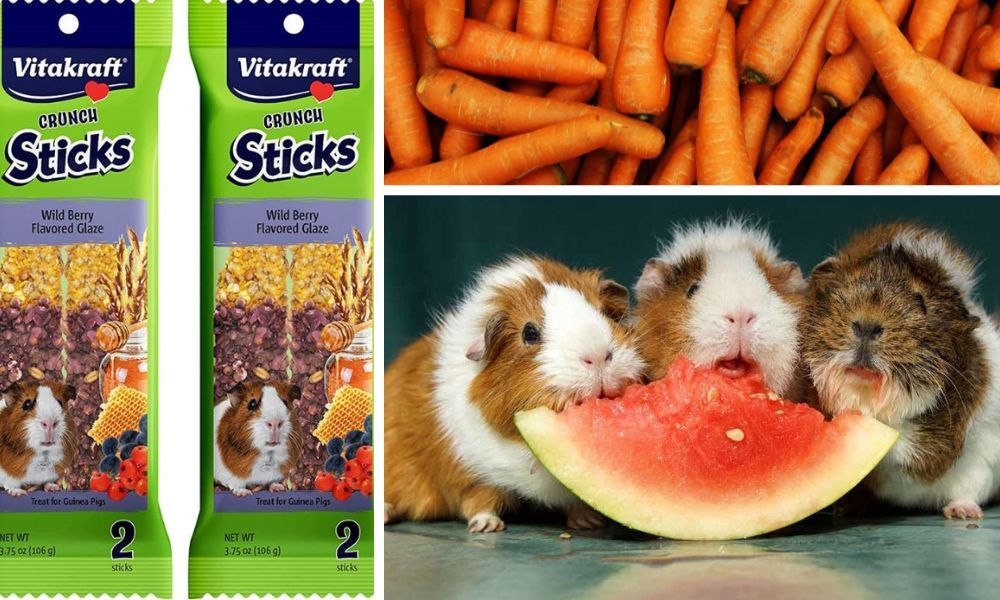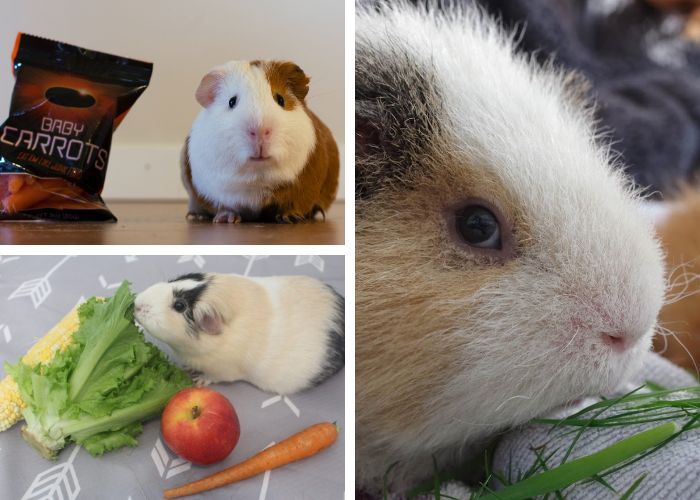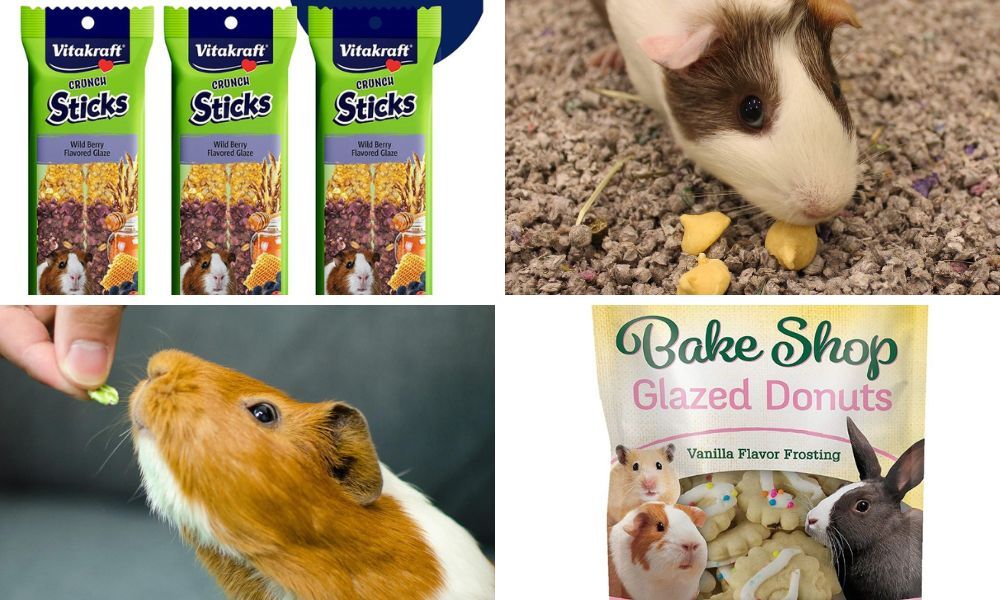Understanding the Different Types of Guinea Pig Treats
Pets need treats too, and guinea pigs are no exception. If you want your cavy to live a happy, healthy life then you need to understand the different types of treats available!

Guinea pigs are simply adorable! With those cute eyes and those adorable squeaks, they can steal anyone’s heart. So, it’s no surprise that all guinea pig owners, without hesitation, want to shower them with love and care. But hey, don’t forget the treats! You read that right, guinea pig treats! The world of guinea pig treats is vast and confusing.
As a dedicated guinea pig parent, it’s no secret that your little cavies have a big appetite. And let’s face it—it’s nearly impossible to resist those cute, begging eyes when they want a treat. But with so many types of treats on the market, how do you choose the right one for your furry friend? In this blog post, we will help you understand the different types of treats, so you can better fulfill your guinea pig’s every desire while ensuring they fit into a balanced daily diet.
Fruits and Vegetables - The All-Time Favorite of Guinea Pigs
Fruits and vegetables make excellent treats, and what’s more is that they’re healthy too! Fruits should be given as an occasional treat due to their high sugar content. Your furry little friend will go bonkers for a fresh slice of apple, a juicy piece of watermelon, or even a leafy green lettuce. Just make sure to avoid fruits that are high in sugar, such as grapes or bananas, as these can be detrimental to your guinea pig’s health. Bell peppers – red, yellow, orange, or green (bell peppers are high in vitamin C – great for guinea pigs!) While guinea pigs eat a variety of fruits and vegetables, it’s important to provide a balanced diet of pellets, hay, and fresh vegetables.
Keep it Natural
When selecting treats for your guinea pigs, always go for natural ones. Avoiding processed treats helps prevent the intake of empty calories, which can lead to health issues. Just like with human nutrition, the more natural the food, the better it is for your furry friend. And since guinea pigs have sensitive digestive systems, it’s essential to avoid processed treats and stick to fresh fruits and veggies. Some examples of natural guinea pig treats include apples, bananas, blueberries, parsley, carrots, and broccoli. Carrots are loved by many guinea pigs but are best for occasional training only.

Treat Sticks and Chews - Fun and Exciting
Treat sticks and chews make great guinea pig treats, especially for those who love to gnaw on things. These treats come in various flavors, including carrots, honey, and apple, and can keep your guinea pigs busy and entertained for hours. But beware, as too many of these sticks and chews can lead to dental problems and other health issues, so moderation is key.
Timothy Hay and Grass - For Nutritional Goodness
Grass hay should be a vital part of your guinea pig’s diet, but they can also be a treat. Guinea pigs love to chew on hay, and it’s an excellent source of fiber and nutrients for them. Timothy hay or alfalfa are great choices and you can also add dried fruit varieties and treats fortified with vitamin C or superfoods for an added boost. Just make sure you provide a good quality hay and grass to ensure that your guinea pigs gets all the necessary nutrients they need. For a special snack, try mixing some rolled oats into your guinea pig’s pellets or stuff a small cardboard tube with fresh hay or grass.
Commercial Treats - Yum or Yuck?
Commercial guinea pig treats are a popular option and can be found at your local pet store, but beware! Some commercial treats are loaded with sugar and other unhealthy ingredients, which can be hazardous to your guinea pig's health. Always read the ingredients list and opt for a treat that has natural, healthy ingredients.
Human Food - An Occasional Treat in Moderation
If you’re feeling generous and want to share your snack with your cute guinea pig, you can! Some human foods, such as cucumber, carrot, and celery, make excellent guinea pig treats. However, certain human foods can contribute to bladder stones if fed in excess. But be careful not to overdo it, as too much human food can be harmful to your guinea pigs.
Moderation is Key
We can’t emphasize this enough: moderation is crucial when it comes to treating your guinea pigs. Most guinea pigs benefit from a balanced diet and moderation in treats. Even with natural and healthy guinea pig treats, overfeeding can result in health complications such as obesity and digestive issues. So, treat your cavy sparingly, even when they beg with those cute, soul-marked eyes.
The Importance of Hay Cubes
Hay cubes are not only known to help in trimming your cavies’ teeth but also provide an excellent way to treat them. As a crucial component of a guinea pig's diet, grass hay in the form of hay cubes is essential for their health. Guinea pigs love the crunch of hay cubes and don’t worry! They are entirely safe for their digestive system. Hay cubes are available in different flavors and textures to add variety to your guinea pig’s diet.
Pellets aren’t Treats
We know that pellets tend to be the primary diet for guinea pigs, but it’s essential to note that it doesn’t qualify as a treat. While pellets provide an adequate amount of nutrition, additional vitamin C may be necessary, especially if the pellets do not contain sufficient vitamin C due to degradation. As much as pellets provide an adequate amount of nutrition, they lack the excitement and diversity that most guinea pig treats provide. Therefore, even if your pet loves his pellets, they should not substitute actual treats.
Choose the right “commercial” treat
Most commercial guinea pig treats are usually high in sugar, which makes them like junk food for your cavies. Dried fruits can be a healthy option if they are made from all-natural ingredients. Therefore, when purchasing pre-packaged guinea pig treats, always read the ingredients list to ensure that they contain natural ingredients and are low in sugar. Some good examples of commercial guinea pig treats include Oxbow Simple Rewards, Kaytee Fiesta, and Vitakraft Drops.

At the end...
Treating your guinea pigs is necessary to ensure that they remain happy and healthy. However, it’s essential to choose the right kind of treat and use them moderately. Guinea pigs cannot synthesize their own vitamin C and need it from their diet. Stick to natural guinea pig treats, and if you must go for pre-packaged ones, stick with low-sugar options. With these tips, you’ll be sure to please your furry friends and keep them healthy.
In conclusion, guinea pigs are lovely animals that deserve all the love, care, and attention in the world. A significant part of that care revolves around the treats that we give them. Providing healthy treats is important for all small animals, including guinea pigs. As discussed above, different types of small animal treats can provide various benefits to your pet, from nutrition to entertainment. So, remember to choose treats that are healthy, natural, and delicious, and your guinea pigs will love you for it.
If you are looking for the best treats for your furry friend you came to the right place. Tap the button below to see our list of top 5 treats for guinea pigs you can buy now!

